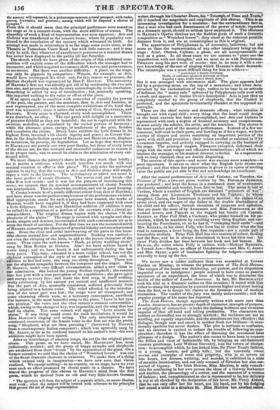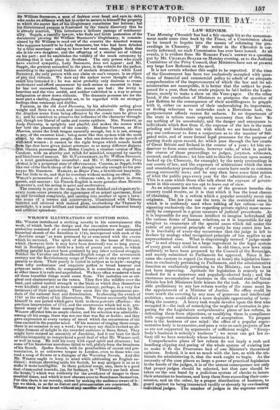We never saw a colder audience than was assembled at
Covent Garden on Monday, to witness the presentation of 771e Irish Heiress. The temper of the house was dubitating, yetpatient, and its disposition impartial even to indulgence : people seemed to have come as passive spectators of an experiment, the issue of which was to determine the merits of the author of London. Assurance. In fact, Mr. Bouncicsurr took his trial as a dramatic author on this occasion : it rested with him either to stamp his reputation by a second success higher and more lasting , than the first, or to forego his claims to the foremost rank of modern dramatists.. The verdict of the jury was tacitly unfavourable; and the popular prestige of his name has departed. The Irish Heiress, though apparently written with more care than London Assurance, has no greater depth of character, strength of purpose, or originality of conception : it lacks the dashing boldness and vivacious impulse of that off-hand and telling production. The characters are neither so diversified nor so strongly marked ; the incidents are not so startling, yet equally improbable, and the situations are less effective ; th4 , dialogue, though neat and smart, is neither fresh nor brilliant—it occa- sionally sparkles but never flashes., The plot is intricate to confusion, and no interest is excited to induce the trouble of following its com- plexities; therefore it has the effect of dimming the occasional faint glimpses of a design. The author's aim seems to have been to censure the follies and vices of fashionable life, by bringing an old-fashioned country gentleman, Lord William'Daventry, into the vortex of dissipa- tion: to accomplish which, he has linked him, Sir Peter Teazle fashion, to a young, wanton, and giddy wife ; , but the 'venerable censor nioruni and exemplar of sense and propriety, who is' so severe on: late hours, low dresses, waltzing, and scandal, is exhibited in a state of maudlin intoxication, and, not only accused of flirtation but also sus- pected of bigamy. The Irish Heiress, Miss Merriam is only remark- able for combining in her own person the ideas of a Galway foxhnnter and duellist, the phraseology of a eottier, and the manners of a woman of fashion ; and, unsophisticated as she is represented to be, her delicacy is not at all shocked by the declaration of her lover, Mr. Poi), ardent, that he can only offer her his heart, not his hand, nor by his dodging her round a table hi a drunken fit. Niss Alerrion has another swor, Sir William Stanmore, a ME of fashion over head and ears in debt, who seeks an alliance with her in order to secure to himself the property to which the secret fact of his illegitimacy constitutes her heiress ; but his disinterested purpose is frustrated by the timely discovery that he is already married, This introduces a delicate passage of sentiment- ality tSupple, a rascally lawIer, who finds and holds possession of the documents proving Fir William Stanmore's 'illegitimacy, is commis- sioned by Sir William to send out of the country the deserted woman who supposes herself to be Lady Stanmore, but who had been deluded by a false marriage : asking to know her real name, Supple finds that she is his own daughter, and the offspring of a similar act of villany on his part ; and he establishes the validity of the mock ceremony by eliciting that it took place in Scothed. The only person who could have excited sympathy, Lady Stanmore, does not appear ; and Mr.
i Supple, the greatest scoundrel n the piece, h the vehicle for the pathos, according to the approved fashion of modern dramatists ; while Lord Daventry, the only person' with any claim on one's respect, is an object of pity and ridicule. We dare say the author never thought of this, much less intended it ; he was most probably-only desirous to create excitement and afford amusement by such means as occurred to him : be has not succeeded, because the means are bad ; the levity is heartless and the vice sordid, and neither exhibited in a way to arouse indignation or draw down ridicule. The dramatis personse are for the most part a shabby, disagreeable set, to be regarded with no stronger feelings than contempt and dislike.
FARREN, as the old Lord Daventry, by his admirable acting gives weight and force to a weak and inconsistent Character. He prevents the drunken scene from being offensive by the comic turn he gives to it ; and he contrives to preserve the influence of the character through- out, though too liberal of oaths and coarse epithets. Mrs. NisnErr, as Lady Daventry, is sprightly and playful; and makes the scenes with her lord the pleasantest of Ile comedy. Madame VESTRIS, as Miss Merrion, utters the'Irish brogue naturally enough, but it is not, strange to say, of the sweetest kind ; being more like that spoken with the teeth closed, by the common people, than what one.detects in the speech of well-bred women : it cannot, be the right brogue which sounds harsh from lips that have given dulcet utterance to so many different dialects. ORGER personates Mrs. Bolton Comfort, a virulent version of Mrs. Candour, with an alacrity and relish for mischief, tempered by suavity and blandness of manner. Mr. G.VANDENHOFF, as Sir William Stanmore, is a most gentlemanlike scoundrel ; and Mr. C. Mkrziaws, as Percy Ardent, is in a perpetual state of effervescence. COOPER, as Supple, looks like one of-the black sheep of the Jai; though not oily enough for his pro- totype Mr. Gammon: HARLEY, as Major Fuss, a bewildered busybody, has but little to do, and that, be overdoes without making an effect. Mr. Wioara's personation of Lenoir, a villanons valet, is perfect in dress, speech, and manner ; his French-English is more genuine than MORRIS BARNETT'S, and his acting is quiet and unobtrusive. , The comedy is put on the stage in the most finished and elegant style : every room-scene presents the appearance Of an actual apartment, fitted up and furnished completely, and opening into another or upon a lawn : one scene of 'a terrace and "conservatory, illuminated with Chinese lanterns and adorned With stained glass, overlooking the Thames by moonlight, is a most brilliant and tasteful combination of natural beauty and artificial splendour.



























 Previous page
Previous page